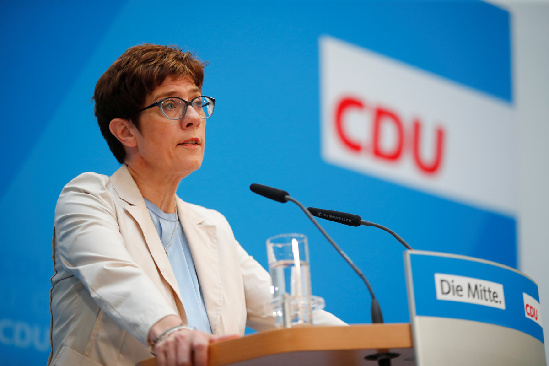
By Dong Yifan
France and Germany, which are regarded as the "engines" of the EU, have diverged on the direction and strategic choice of EU development recently. German Defense Minister Annegret Kramp-Karrenbauer said that with Biden's victory in the US presidential election, Europe needs to abandon unrealistic illusions such as European sovereignty and strategic autonomy. Instead, it should respond to challenges through enhanced cooperation and strategic coordination with the US. In this regard, French President Emmanuel Macron pointed out that only when Europe has independent sovereignty in defense, economy, and trade, can it win the US's respect and become a partner in equal dialogue.
In the past few years, the Trump administration has adopted an "America First" policy and focuses on "great-power competition". It has brought unprecedented impact to EU-US relations. The above remarks of the German Defense Minister reflected that after Biden's victory in the US presidential election, European strategic circles began to regain high hopes for the transatlantic partnership. For Karrenbauer, the successor of Merkel, the above remarks are intended to win the support of domestic transatlantic political forces and scholars in order to pave the way for the 2021 parliamentary election.
For France, whose European policy has always been "de Gaulleism", it hopes to build the EU into an independent global strategic force and an amplifier for France's status as a major power and a tool for expanding its national interests. By comparison, Germany, whose armed forces have been severely restricted after World War II, regards defense cooperation under the NATO framework and the US military presence as the fundamental guarantee for its national security and resistance to potential threats. Besides, the US is Germany's second-largest trading partner outside the EU, which also gives Germany a strong "American dependence complex."
The war of words between Karenbauer and Macron reflects the Franco-German disagreement in traditional strategic thinking and also demonstrates the presence of two completely different attitudes within the EU on policy options. In fact, the pursuit of European sovereignty is more about the long-term development of the union, rather than focusing on the impact of the Trump era. Historically, the US has imposed long-arm jurisdiction and sanctions on allies' companies. The US has also forced Europe to make concessions on economic and trade issues on the grounds of weakening security protection. The Clinton, Bush Jr., and Obama administrations all forced allies to increase defense spending. To get rid of its dependence on the US in the economy, trade, defense, science, and technology, the EU has continuously accelerated the pace of strategic independence, hoping to transform strategic autonomy into a stimulus for its long-term development.
It needs to be pointed out that the EU has encountered a series of challenges such as debt, refugees, "Brexit", and terrorism in recent years. The outbreak of the coronavirus pandemic this year has brought an unprecedented impact on its economy and society. Within the union, disagreements and criticism on sovereignty issues and the EU's approach to handling the pandemic and stabilizing the economy make the EU's future path even more uncertain.
The divergence between France and Germany on European sovereignty is the epitome of disagreements on the EU's future roads -- namely whether to restore close relations with US or to promote EU independence. At present, these two options will still coexist for a long time, and the long-term differences may affect the future development of the EU. It is expexted that US-EU relations will still be difficult to make major changes in the foreseeable future.
(The author is an assistant research fellow at the Institute of European Studies, China Institutes of Contemporary International Relations.)













